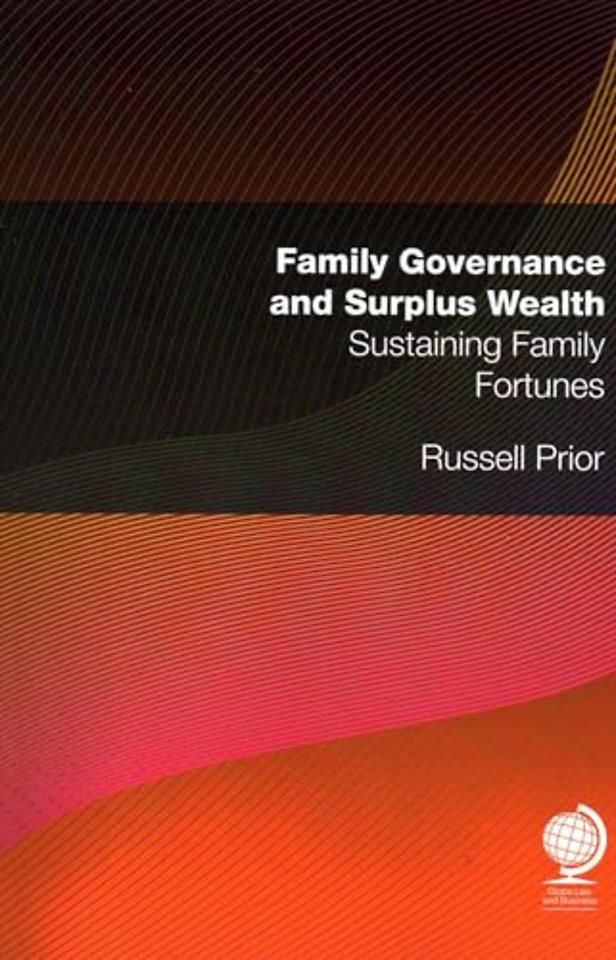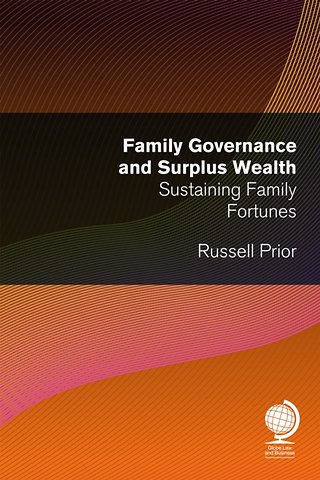Family Governance and Surplus Wealth
Sustaining Family Fortunes
Samenvatting
With the expected rise in the global total of ultra-wealthy individuals, and the trillions of dollars and family businesses predicted to change hands over the next two decades, the considerable challenges involved in managing and transitioning ‘surplus’ wealth are set to multiply rapidly, affecting a much larger number of families and family members.
Family governance, which refers to the structures and processes families use to organise themselves and guide their relationship with their wealth, is a key tool in the transition of ownership and wealth between the generations, but it is neither well understood nor explained, particularly in the context of surplus wealth.
Family Governance and Surplus Wealth: Sustaining Family Fortunes, written by Russell Prior, an experienced consultant and adviser in Family Governance, Family Enterprise Succession and Philanthropy, demystifies the topic and shows advisers and families how governance can assist with the challenges of managing and transitioning surplus wealth.
It covers the characteristics and challenges of surplus wealth, why wealthy families need family governance and how family governance can help families with the successful transition of surplus wealth between the generations.
Key takeaways include:
- Understand the need for a sense of shared purpose between the generations for surplus wealth and family enterprises, so it can succeed into future generations;
- Determine ownership and leadership succession within the family enterprise;
- Manage the balance of power and decision making in and between the generations;
- Prepare the younger generation for their role in a family with surplus wealth;
- Prepare the older generation to let go of some responsibilities but show them how to take up new reins within the family;
- Balance the interests of family members managing the family wealth or enterprise with those who do not, and with non-family members involved in the management of the wealth or business; and
- Understand how major decisions can be taken within a complex family wealth structure or a family enterprise.
This title will be important reading and reference for all practitioners advising ultra-wealthy individuals and business families, including family business advisers, private bankers, lawyers, accountants, and financial advisers. It will also be of significant interest to ultra-wealthy family members and family office leaders.
Key features at a glance:
- Introduces the concept of surplus wealth and simplifies the wide range of options available regarding what to do with significant wealth, as well as providing guidance on how to enact these decisions
- Helps families to identify and articulate more clearly the objectives for their surplus wealth, allowing proper discussion and focus on the process for achieving those objectives, potentially enabling wealth to be sustained for generations
- Through practical examples of where and why the need for family governance starts, demonstrates how family governance can be developed, and in doing so also shows why all too often it isn’t
- By breaking down family governance into its many separate component parts, including eg, the Family Council and the Family Arbitration Committee, and discussing what they mean or how they can be used, provides practical help for how family governance can be used to help families
Specificaties
Inhoudsopgave
Part I: The challenges of surplus wealth 9
1. Introduction 11
2. Surplus wealth 12
3. The human face of wealth 18
4. Managing surplus wealth 21
Part II: The role of family governance in managing surplus wealth 23
1. Defining family governance 25
2. Why do families with surplus wealth need family governance? 31
3. Family governance and transition 35
4. When and how family governance develops 37
5. Summary 63
Part III: Elements of family governance 65
1. Introduction 67
2. Governance structures 68
3. Family vision statement 72
4. Elements of a family governance framework 79
5. Corporate governance elements 178
6. Trust governance elements 212
A final word 233
Notes 235
About the author 237
About Globe Law and Business 239
Anderen die dit boek kochten, kochten ook
Net verschenen
Rubrieken
- aanbestedingsrecht
- aansprakelijkheids- en verzekeringsrecht
- accountancy
- algemeen juridisch
- arbeidsrecht
- bank- en effectenrecht
- bestuursrecht
- bouwrecht
- burgerlijk recht en procesrecht
- europees-internationaal recht
- fiscaal recht
- gezondheidsrecht
- insolventierecht
- intellectuele eigendom en ict-recht
- management
- mens en maatschappij
- milieu- en omgevingsrecht
- notarieel recht
- ondernemingsrecht
- pensioenrecht
- personen- en familierecht
- sociale zekerheidsrecht
- staatsrecht
- strafrecht en criminologie
- vastgoed- en huurrecht
- vreemdelingenrecht








